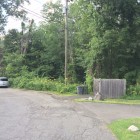Government
Objection to Proposed Subdivision on ‘One of the Streets in New Canaan That Time Forgot’
|
Saying the proposed subdivision of a long-unused, sloping 4.76-acre lot on Hill Street will exacerbate runoff, lower property values and do nothing for the aesthetics of an already “forgotten” New Canaan neighborhood, an attorney for one neighbor is calling for a new engineering design and plans. Hill Street is windy road of 10 modest houses and condos that runs just above and roughly parallel to Route 123 for about 500 feet, just east of Brushy Ridge Road. Developers have put forward a plan to subdivide into two what is called “Lot 72”—a thickly wooded property located within the Fivemile River watershed that’s belonged to the same family since it was purchased for $19,500 in 1966, tax records show. Plans call for two single-family residences with a single, shared access driveway from Hill Street. The Inland Wetlands Commission on June 30 approved the driveway on several conditions.

